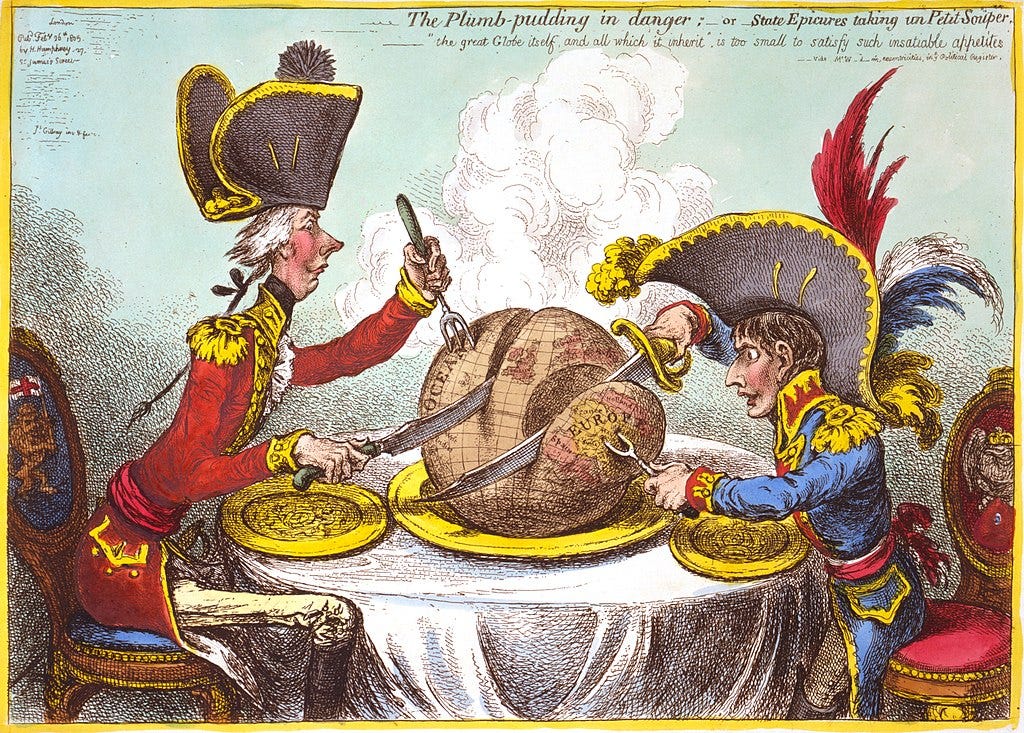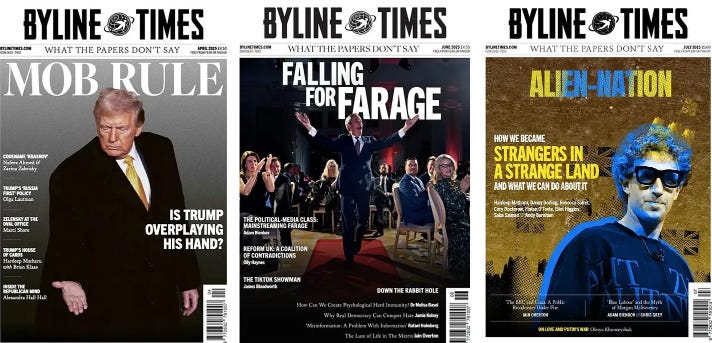Carving Up a Baked World
As Trump and Putin prepare to meet in Alaska, Peter Jukes revisits the perilous game of great power politics in this editorial from the Byline Times August print and digital edition
The Plumb-Pudding in Danger, James Gillray’s 1805 cartoon of the French Emperor Napoleon and the British Prime Minister Pitt the Younger, not only satirised the two warring superpowers as they carved up the Atlantic and the European landmass between them, it also visualised the Victorian ‘great power’ theory of history.
Napoleon, of course, did not gobble up continental Europe for long, and Britain was not content to just patrol the seas riding on its naval supremacy. It had to cross the Channel to defeat France.
But the principles of territorial imperial competition defined much of the era, culminating in the ‘scramble for Africa’ at the end of the 19th Century, and the frustrated ambitions of Germany that led to two world wars.
For most of the postwar period, the United States apparently opposed this imperialistic view of world affairs.
After the carnage of the First World War, President Woodrow Wilson was the key promulgator of a post-imperial order of ‘self-determination’ with the League of Nations as the forum, rather than war and conquest, to resolve international disputes.
After that failed to stop the Second World War, successive American administrations have, at least when it comes to Europe, stood behind a framework of international law, using the voluntary association of NATO to defend it, and the soft power persuasion of major financial investment to bind it. The EU was the ultimate expression of this post-imperial rules-based order of economic interdependency and federated bargaining.
But with the second accession of President Donald Trump, all that has changed. Changed utterly.
This is a paywall-free article from the August Print Edition of Byline Times. For dozens of other exclusive articles, features, columns and investigations, subscribe
We may doubt how serious he is about gaining control of Greenland and usurping the Danish administration. But it is clear from the verbal attacks of Vice President JD Vance (who has accused European leaders of turning their back on the continent’s “most fundamental values”) and from the pronouncements from the US State Department – and above all the trade war over tariffs – that ‘America First’ Trumpism considers the European Union to be an ideological threat and an economic adversary.
The EU, to many of Trump’s officials, is based on soft ‘woke’ principles. These include Article 1 of Protocol 13 of the European Convention on Human Rights, preventing capital punishment – which EU member states are bound to via the Council of Europe – and an inherent acceptance of compromise and pooled sovereignty. There is nothing more repugnant to the sociopathic anger of ‘MAGA’ supporters than a benign community of nations.
By overtly breaking 80 years of Pax Americana (for all its hypocrisies and deceptions), Trump has emboldened ethno-nationalist authoritarians all over the world.
Vladimir Putin is the obvious beneficiary (so far), with the US administration’s reluctance to help Ukraine – which first prompted the ire of Russia by attempting to rebel and join the EU rather than Putin’s ‘Eurasian Union’.
Israeli Prime Minister Benjamin Netanyahu has also used this disruption of the international order to extend his devastation and depopulation of Gaza, so close to European shores.
We seem to be returning to the ‘great power’ era of global affairs, when only ‘might is right’ and missiles are traded between Israel, the US, and Iran in an unstable game of retaliatory power.
Chinese President Xi Jinping will be watching closely as he conducts his military exercises in the Taiwan Straits.
In all these ways, a decades-long postwar period during which nations tended to form large coalitions and tried to negotiate conflicts through international institutions, appears to have come to a sudden, shocking end.
But can a new ‘scramble’ for world dominance replace it? As Bruno Maçães points out in this edition, and as Putin has learned to his cost, merely occupying physical territory is no longer a guarantee of power. Thanks to our economic and social systems, most of the key affairs of the world are conducted in complex networks of finance, trade, governance, and social discourse. To dominate that, you have to build strong, resilient (and often firewalled) virtual worlds.
The EU has done virtually nothing in this realm of virtual soft power, and the US seems determined to dismantle all the key departments dealing with cyber threats, foreign aid, vaccines and medicine, and monitoring global warming.
Beyond the virtual worlds, whether powered by resource-hungry AI servers or vulnerable undersea cables, we are reaching the limits of our ecosystems.
In an updated version of Gillray’s memorable image, all of us are a baked Alaska pudding still in the oven, and globally interdependent when it comes to the consequences of climate change. The new Napoleons and Pitts would be carving up a cake that is irremediably burnt. But perhaps they know that. Hence the hurry.




